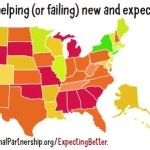Paid Leave At A Small Business
Can I get paid family leave if I work for a small business? Can I afford to offer it if I own a small business? Maternity and paternity leave can be tricky if you are talking about a business with very few employees.
The good news is, more and more small business owners are realizing they have an advantage over larger employers regarding family leave. Because of their size, small businesses have more flexibility to work with their employees to allow them the time off they need, perhaps the flexible schedule to transition once a child has arrived, and the family-friendly culture that so many workers prioritize.
If you have one employee every five years needing leave, as opposed to five employees every month, you can afford to be more flexible and yes, even more generous, knowing it will pay you back in the long run through employee satisfaction, productivity and retention. Women who get paid leave are much more likely to return to their jobs, and remain at their jobs.
As companies fight for employees by offering more benefits, this is one way small businesses can compete with places like Amazon, Facebook and Netflix. Studies are showing that family-friendly policies and parental leave matter more to millennials than free lunches and gym memberships.
If you own a small business, now is the time to do some research on how other smaller companies and startups are affording paid leave for their employees. Use List Your Leave to find out what companies in your city, state and industry are offering.
If you are currently working for a small business that does not have a family leave policy, you are not alone. Right now according to the Society for Human Resource Management only 12 percent of U.S. companies with less than 100 employees offer paid maternity leave. Which means if your company does not have a paid leave policy in place, it may be up to you to negotiate your own leave.
Employees that meet the Family Medical Leave Act requirements are allowed 12 unpaid weeks off by law, regardless of how large your company is (although it must have at least 50 employees to qualify you for FMLA). However, if you do not meet the requirements for FMLA, you may need to do your own research and have a plan to talk to your employer about what kind of leave you need and how it can work for both your family and your job.
Some things to think about would be how much vacation time you have saved up, are there state laws that might help you get some paid leave, do you have short-term disability insurance you could leverage, who will cover your responsibilities while you are out, and what are the industry standards for family leave? Be prepared before you have any conversations with your boss.
If your company does not offer a maternity or paternity leave policy, use List Your Leave to find out what other companies in your city, state or industry offer as a starting point. And if you took a family leave with your small business make sure to leave an anonymous review or add the company policy so you can help other employees at your company, and small businesses around the U.S., get smarter on leave. Remember, working at a small business can offer you more options than a larger company that has rigid policies in place for all workers. With the right conversations and priorities, both small business employees and their bosses can be benefit from a paid maternity and paternity leave.








William
November 02, 2016 02:53:07 am ReplyThis is very much great and hope fully nice blog. Every body can easily get perfect information from here. http://www.smallbusinessrightstart.com/
Louise
July 21, 2016 07:18:14 pm ReplyIf not for your writing this topic could be very counolvted and oblique.